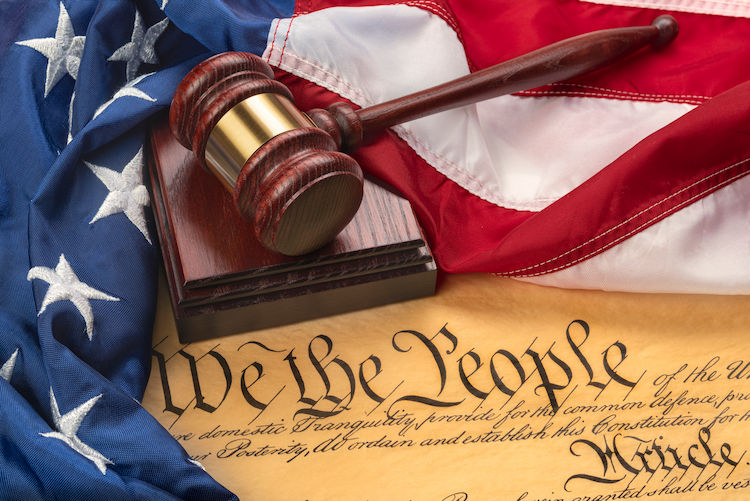Unanimous Supreme Court Rejects First Amendment Challenge to Lanham Act’s Name Clause

In Vidal v. Elster, 602 U.S. ____ (2024), the U.S. Supreme Court held that the names clause of Lanham Act, which prohibits the registration of a mark that consists of a name identifying a particular living individual without their consent, does not violate First Amendment. The Court’s unanimous decision prevents registration of the “Trump too small” trademark.
Facts of the Case
Inspired by a 2016 Presidential primary debate exchange between then-candidate Donald Trump and Senator Marco Rubio, respondent Steve Elster sought to federally register the trademark “Trump too small” to use on shirts and hats. An examiner from the Patent and Trademark Office refused registration based on the “names clause,” a Lanham Act prohibition on the registration of a mark that “[c]onsists of or comprises a name . . . identifying a particular living individual except by his written consent.” The Trademark Trial and Appeal Board affirmed, rejecting Elster’s argument that the names clause violates his First Amendment right to free speech.
The Federal Circuit reversed, holding that the names clause runs afoul of the First Amendment. The court first concluded that the names clause is a viewpoint-neutral, content-based restriction on speech subject to at least intermediate scrutiny. It next concluded that the Government could not satisfy even intermediate scrutiny because the names clause does not advance any substantial governmental interest.
Supreme Court’s Decision
The Supreme Court reversed. According to the unanimous Court, the names clause does not violate Elster’s First Amendment right to free speech.
The Court first addressed whether the names clause constituted a viewpoint-based restriction, noting that it has twice concluded that trademark restrictions that discriminate based on viewpoint violate the First Amendment. It ultimately concluded that the names clause does not facially discriminate against any viewpoint because it does not single out a trademark “based on the specific motivating ideology or the opinion or perspective of the speaker.”
Rather, it is a content-based restriction because it establishes a ban based on the content of the trademark: “The names clause turns on the content of the proposed trademark — whether it contains a person’s name,” Justice Clarence Thomas explained. “If the trademark does contain a person’s name, and the registrant lacks that person’s consent, then the names clause prohibits registration.”
In reaching its decision, the Court also acknowledged that it was the first time it had addressed the constitutionality of a content-based—but viewpoint-neutral— trademark restriction. In declining to apply heightened scrutiny, the Court emphasized that trademark rights have always coexisted with the First Amendment, and the inherently content-based nature of trademark law has never been a cause for constitutional concern.
Not surprisingly, Justice Thomas also cited the “history and tradition” of content-based trademark restrictions, particularly restrictions on trademarks containing names.“The names clause is of a piece with a common-law tradition regarding the trademarking of names,” he wrote. “We see no reason to disturb this longstanding tradition, which supports the restriction of the use of another’s name in a trademark.”
The Court emphasized that its decision is narrow. It specifically noted that its decision does not set forth a comprehensive framework for judging whether all content-based but viewpoint-neutral trademark restrictions are constitutional or suggest that an equivalent history and tradition is required to uphold every content-based trademark restriction.
Previous Articles
Justices Skeptical of Trump Administration Tariffs
by DONALD SCARINCI on December 18, 2025
The U.S. Supreme Court heard oral arguments in Learning Resources, Inc. v. Trump (consolidated with...
SCOTUS Takes Up Key Election Case Involving Mail-In Ballots
by DONALD SCARINCI on December 17, 2025
The U.S. Supreme Court recently granted certiorari in a key election case, Watson v. Republican Nat...
SCOTUS Adds Second Amendment Case to Docket
by DONALD SCARINCI on November 27, 2025
The U.S. Supreme Court will consider another important Second Amendment case this term. The latest ...
The Amendments
-
Amendment1
- Establishment ClauseFree Exercise Clause
- Freedom of Speech
- Freedoms of Press
- Freedom of Assembly, and Petitition
-
Amendment2
- The Right to Bear Arms
-
Amendment4
- Unreasonable Searches and Seizures
-
Amendment5
- Due Process
- Eminent Domain
- Rights of Criminal Defendants
Preamble to the Bill of Rights
Congress of the United States begun and held at the City of New-York, on Wednesday the fourth of March, one thousand seven hundred and eighty nine.
THE Conventions of a number of the States, having at the time of their adopting the Constitution, expressed a desire, in order to prevent misconstruction or abuse of its powers, that further declaratory and restrictive clauses should be added: And as extending the ground of public confidence in the Government, will best ensure the beneficent ends of its institution.





